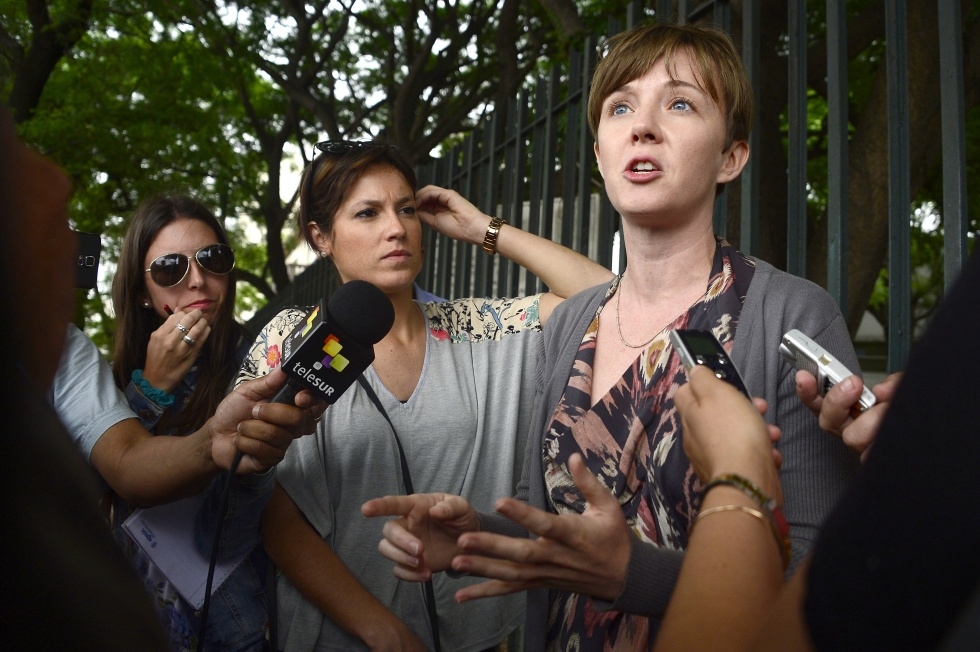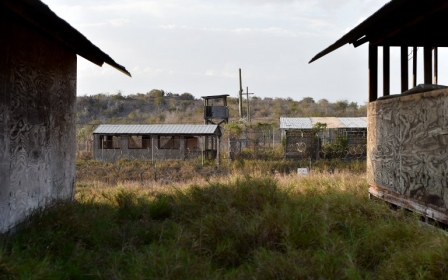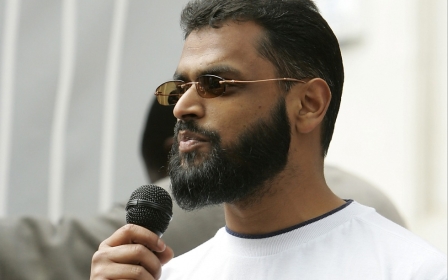After Guantanamo, ex-inmates seek new lives in Uruguay

MONTEVIDEO, Uruguay - Six Guantanamo inmates transferred to Uruguay prepared Monday to begin new lives as free men after more than a decade in what one called a "black hole".
The men, who arrived in Uruguay Sunday on refugee status after 12 years of detention without charge, are undergoing medical exams at a military hospital.
But soon they will be "walking around the streets of Montevideo... like anyone else in the neighborhood," said Uruguayan Defense Minister Fernandez Huidobro.
Uruguay's leftist President Jose Mujica had announced in March that the South American country would take in the inmates on "humanitarian grounds," in a bid to help his US counterpart Barack Obama fulfill his long-delayed promise to close the prison set up in the wake of the 9/11 attacks.
Huidobro said the men were all "fine". But he expressed concern over the "very diminished" condition of Syrian national Jihad Diyab, 43, who had staged a hunger strike and requested a US court to order prison officials to stop force-feeding him.
The defense minister said Sunday morning the men would be released in a "matter of hours," but Diyab's lawyer Cori Crider, who is in Uruguay following the process, said the timetable was more complicated.
"Each of them has a different health situation, so some of them look pretty robust, and some of them might need a little bit of intensive care," she said.
Another of Diyab's lawyers, Alka Pradhan, said her client can barely walk and mostly uses a wheelchair after "horrible treatment" in detention, but is hoping to build a new life in Uruguay, whose government is giving the men financial support.
"He's really hoping that he can learn Spanish quickly, that he can integrate and show his gratitude to the Uruguayan people and prove that everything that has been said wrongly about him and the other detainees is false," she told AFP.
The men - including three other Syrians, a Palestinian and a Tunisian, all in their 30s and 40s - were among the first detainees sent to Guantanamo in 2002.
Detained as part of the US "War on Terror" for alleged links to Al-Qaeda, they were never charged or tried.
They had been cleared for release, but the US ruled they could not be sent to their home countries for security reasons.
A total of 779 prisoners have been held at Guantanamo in the nearly 13 years since the detention centre was set up at the US naval base in the southeastern corner of Cuba.
The Pentagon said 136 now remain, of whom 67 have been approved for release by Obama's administration or that of his predecessor, George W. Bush.
Thwarted by Congress in his effort to close the prison, Obama has had to rely on a handful of countries that have agreed to accept detainees.
Uruguay is the first South American country to do so.
In all, 19 detainees have been transferred this year as the administration accelerates efforts to close the prison.
A new home
Another former inmate, Syrian national Abdelhadi Faraj, described his experience in a letter sent by his lawyers to Uruguayan newspaper El Pais.
"My name is Abdelhadi Omar Faraj. For the past 12 years I've also been known as prisoner number 329 at Guantanamo," he wrote.
He described himself as a migrant worker from a modest family who was arrested while trying to flee the war in Afghanistan in 2001.
He was detained at the Pakistani border, handed over to the US Army in exchange for payment, held in "subhuman conditions" and eventually flown to Guantanamo in June 2002, he said.
A panel of senior officials from the US military and intelligence establishments cleared him for release in 2009 but did not want to send him to Syria, by then in the grips of civil war.
"If it hadn't been for Uruguay, I would still be in that black hole," he said.
He said he was already a fan of Uruguay's national football team and hoped to learn Spanish and find a job.
The six men were named by the Pentagon as Diyab; Faraj; fellow Syrian nationals Ahmed Adnan Ahjam and Ali Husein Shaaban; Palestinian Mohammed Tahamatan; and Tunisian Abdul bin Muhammad Abbas Ouerghi.
Lawyers said the men were eager to get in touch with their families and possibly bring them to Uruguay.
Middle East Eye propose une couverture et une analyse indépendantes et incomparables du Moyen-Orient, de l’Afrique du Nord et d’autres régions du monde. Pour en savoir plus sur la reprise de ce contenu et les frais qui s’appliquent, veuillez remplir ce formulaire [en anglais]. Pour en savoir plus sur MEE, cliquez ici [en anglais].




